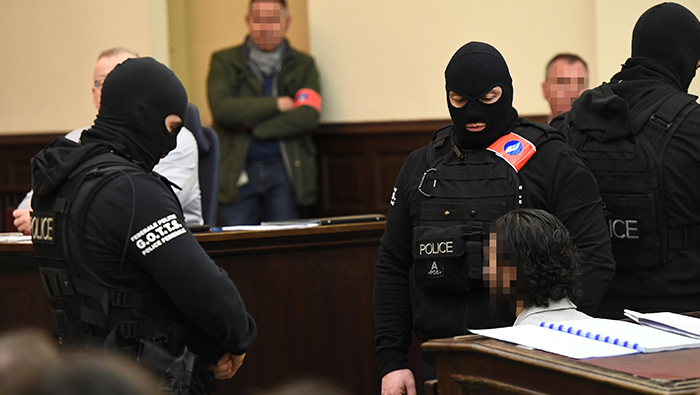
Brussels: The prime surviving suspect in the 2015 IS attacks on Paris appeared to refuse to speak as his trial in Belgium over a shooting that preceded his arrest got under way in Brussels on Monday.
Salah Abdeslam, wearing a white shirt and his hair and beard long in contrast to the cropped, clean-shaven man seen in wanted posters across Europe during his four months on the run, was asked by the judge to rise and give his name. The 28-year-old, in his first public appearance, sat and seemed not to answer.
After a brief adjournment to hear arguments about the representation of victims' families, the hearing continued with the questioning of Abdeslam's alleged accomplice in the shooting incident on March 15, 2016, when several French and Belgian police officers were wounded in Brussels.
Abdeslam's apparent reluctance to engage with the court may prove a disappointment to Parisians who hoped he might end more than two years of silence to give some indication of how and why the attacks which killed 130 people were organised.
His trial in France is not expected until next year. He was not charged over the IS suicide bombings in Brussels a week after the shootout and four days after his arrest, though prosecutors say the March 22 attacks, which killed 32 people, were triggered by the cell's fear that Abdeslam might reveal plans for a new attack in France under interrogation.
Abdeslam arrived under heavy guard from France, where he has been held under 24-hour suicide watch near Paris. He will spend the nights of the coming week of Belgian hearings in a high-security French prison just across the border.
Co-accused Sofien Ayari, a 24-year-old Tunisian, told the court that he had been with IS forces in Syria and that he had been with Abdeslam at the site of the shootout.
Shootout
Ayari and Abdeslam face up to 40 years in prison for attempted murder in relation to terrorism. When police, hunting for the Paris suspects, went to an apartment in the southern Brussels borough of Forest, those inside opened fire, wounding several. The two accused are alleged to have fled, leaving a third gunman to hold off police until he was shot dead.
Four days later, Abdeslam and Ayari were arrested in the western Brussels borough of Molenbeek, close to the former's family home. A French citizen, he was born and raised among the Belgian capital's large Moroccan immigrant community.
Lawyers for Abdeslam accept that he was in Paris on Friday, November 13, 2015, when gunmen and suicide bombers killed 130 at the Bataclan concert hall, near the national stadium and at cafes and restaurants.
His elder brother, with whom he ran a bar in Brussels, was among those who blew himself up. Prosecutors believe the younger Abdeslam, whom they accuse of running logistics for the attack including ferrying fighters from Syria across Europe, would have met the same fate had his explosive vest not malfunctioned.
How the pair, from a broadly secular background with a history of petty crime, were transformed into alleged cogs within extensive IS cells operating in Belgium and France is unclear. A third brother, who has visited Abdeslam in prison, told a Belgian newspaper in December that he might be preparing to talk, inspired by a devout religious faith.
The trial had been due to start in late December but was delayed after Abdeslam belatedly reappointed a defence counsel, who then requested more time to prepare the case. Lawyers do not rule out that there could be further adjournments this week.
The trial has triggered a high alert in Brussels. More than 100 police are expected to be deployed in and around the mammoth 19th-century Palace of Justice, which dominates the skyline over the Renaissance city centre.